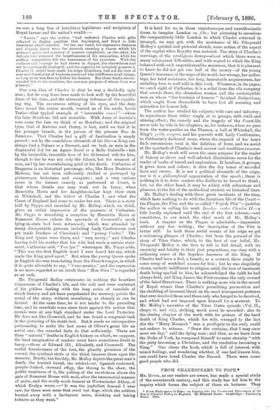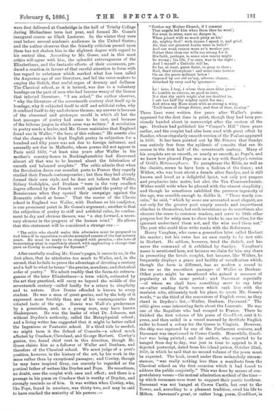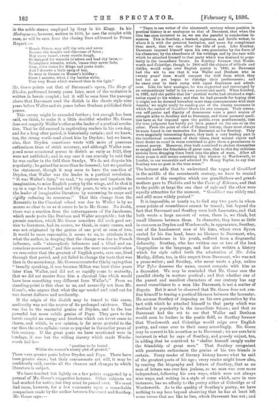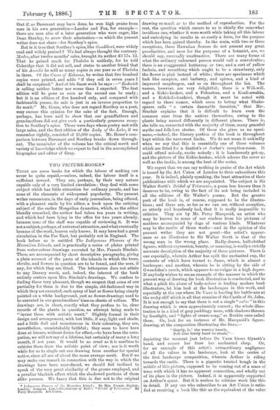FROM SHAKESPEARE TO POPE.*
Ma. GOSSE, as our readers are aware, has made a special study of the seventeenth century, and this study has led him to the inquiry which forms the subject of these six lectures. They • From Shake•peare to Pope : an Inquiry iota the Causes mid Phenomena of the Wee of Clamieal Poetry in England. By Edmund Goose. Cambridge : ilairersity Press. 1885.
were first delivered at Cambridge in the hall of Trinity College during Michaelmas term last year, and formed Mr. Gosse's inaugural course as Clark Lecturer. In the winter they were read before several academic audiences in the United States; and the author observes that the friendly criticism passed upon them has not shaken him in the slightest degree with regard to his central idea, According to Mr. Gosse, and in this most critics will agree with him, the splendid extravagances of the Elizabethans, and the fantastic efforts of their successors, pro- duced a reaction in favour of that careful attention to form with less regard to substance which marked what has been called the Augustan age of our literature, and led the verse-makers to employ the distich, that useful organ of decency and dullness- The Classical school, as it is termed, was due to a voluntary bondage on the part of men who had become weary of the license that infected literature. "I am asked," the author observes, "why the literature of the seventeenth century shut itself up in bondage, why it subjected itself to stiff and artificial rules, why it confined itself to dry and obvious themes; my answer is because of the abnormal and grotesque mould in which all but the best passages of poetry had come to be cast, and because of the hideous jargon in which verse was written." A revolution in poetry needs a leader, and Mr. Gosse maintains that England found one in Waller," the hero of this volume." He asserts also that the change which kept English poetry in subjection for a hundred and fifty years was not due to foreign influence, and assuredly not due to Malherbe, whose poems did not appear in Paris until 1630, "at least nine years after Waller in his mother's country-house in Buckinghamshire had discovered almost all that was to be learned about the fabrication of smooth and balanced couplets." The critic admits that when the Revolution drove our moralist poets to France they eagerly studied their French contemporaries ; but then they had already formed their own style, and he does not believe that Waller, Sidney Godolphin, and Denham "were in the very smallest degree affected by the French revolt against the poetry of the Renaissance when they opened their campaign against the Romantic school at home." That the source of the Classic school in England was Waller, with Denham as his coadjutor, is one prominent point in Mr. Gosse's argument ; another is that the subjection of poetry to stiff and artificial rules, its confine. meat to dry and obvious themes, was "a step forward, a neces- sary element in the progress of the human mind." He allows that this statement will be considered a strange one : —
"The critic who should make this admission must be prepared to find himself in opposition to all the accepted canons of the last seventy years. He must be ready to be charged with paradox,—the love of enunciating what is manifestly absurd, with applauding a change that gave us Cowley in exchange for Spenser."
After carefully reading Mr. Gosse's pages, it seems to us, in the first place, that he attributes too much to Waller, and, in the second, that he fails to prove the advantage of devoting a century and a half to what he terms " the precise, mundane, and rhetorical order of poetry." We admit readily that the fantastic extrava- gances of the later Elizabethans—a term which, estimated by the art they practised, will carry us beyond the middle of the seventeenth century—called loudly for a return to simplicity and to nature. How Donne offended is known to every student. He was a man of great genius, and by the help of it expressed more forcibly than any of his contemporaries the vitiated taste of the age. Donne was Wall-r's predecessor by a generation, and, as a young man, may have known Shakespeare. He was the leader of what Dr. Johnson, not without Dryden's authority, called the Metaphysical school ; and a living writer has suggested that it might be better called the Ingenious or Fantastic school. If a third title be needed, we might term it the School of Conceits—a school much affected by Crashaw, Cleveland, and George Herbert. Cowley's genius, too, found chief vent in this direction, though Mr. Gosse claims him as a follower of Waller and Denham, and therefore of the Classical school. We must judge of a poet's position, however, in the history of the art, by his work in the mass rather than by exceptional passages ; and Cowley, though he may have inspired Gray, can scarcely be regarded as the poetical father of writers like Dryden and Pope. He sometimes, no doubt, uses the couplet with ease and effect ; and there is a passage in his poem on Crashaw that is worthy of Dryden, and strongly reminds us of him. It was written when Cowley, who, like Pope, lisped in numbers, was thirty-two, and may be said to have reached the maturity of his powers :—
"Pardon my Mother Church, if I consent
That angels led him when from thee he went) For even in error, sure no danger is, When joined with so much piety as his!
Ah, mighty God ! with shame I speak it, and grief, Ah, that our greatest faults were in belief !
And our weak reason were ev'n weaker yet, Rather than thus our wills too strong for it.
His faith, perhaps, in some nice tenets might
Be wrong ; his life, I'm sore, was in the right ;
And I myself a Catholic will be, So far, at least, great Saint, to pray to thee ; Hail, Bard triumphant ! and some care bestow On us, the poets militant below !
Opposed by our old en'my, adverse chance, Attacked by envy and by ignorance.
Lo! here, I beg, I whom thou once didat prove So humble to esteem, so good to love, Not that thy spirit might o'er me doubled be, I ask but half thy mighty spirit for me ;
And when my Muse soars with so strong a wing,
'Twill learn of things divine, and first of thee, to sing."
These lines were written five years after Waller's poems appeared for the first time in print, though they had been pre- viously handed about in manuscript after the custom of the age. Denham had published his "Cooper's Hill" three years earlier, and the couplet had also been used with great effect by Sandys, whose singularly smooth version of the Psalms appeared in 1636. It has been pointed out by Mr. Simcox that Sandys was entirely free from the epidemic of conceits that ran its course in the first half of the seventeenth century. Many of his couplets are as smooth, or nearly as smooth, as Pope's, and we know how pleased Pope was as a boy with Sandys's version of Ovid's 3fetainorp1oses. To paraphrase the Bible, as well as the classics, seems to have been a fashion of the times ; and Wither, who was born about a decade after Sandys, and is still known and loved as a delightful lyrist, not only put prayers and prophecies into metre, but also the Ten Commandments. Wither could write when he pleased with the utmost simplicity ; and though he sometimes exhibited the perverse ingenuity of the age, was sensible enough to dislike it. "Those wordy con- ceits," he said, "which by some are accounted most elegant, are not only for the greater part empty sounds and impertinent clinches in themselves, but such inventions as do sometimes also obscure the sense to common readers, and serve to little other purpose but for witty men to show tricks to one another, for the ignorant underrtand them not, and the wise need them not." The poet who could thus write ranks with the Reformers.
Henry Vaughan, who came a generation later, called Herbert his master ; but his verse has an ease rarely to be met with in Herbert. He seldom, however, tried the distich, and has never the command of it exhibited by Sandys. Vaughan's name is mentioned here, not because we claim for him any share in promoting the heroic couplet, but because, like Wither, he frequently displays a grace and facility of versification which, though the form is different, has as modern a sound to the ear as the smoothest passages of Waller or Denham. Other poets might be mentioned who gained a measure of popularity at the same period ; and Davenant especially —of whom we shall have something more to say later on—after sending forth verses which rank him with the mariuist wits, ultimately took his place, to quote Mr. Gosse's words, "as the third of the renovators of English verse, as they stand in Dryden's list,—Waller, Denham, Davenant." The critic gives some interesting facts about the Laureate. He was one of the Royalists who had escaped to France. There he finished the first volume of his poem of Gondibert, sent it to press, and then sailed in a vessel manned by destitute English exiles to found a colony for the Queen in Virginia. However, the ship was captured by one of the Parliament cruisers, and
Davenant was imprisoned in Cowes Castle. Meanwhile, Gondibert was being printed ; and its author, who expected to be
hanged from day to day, was just in time to append to it a dejected postscript, dated from his island prison, October 22nd, 1650, in which be said that no second volume of the poem must, be expected. The book, issued under these melancholy circum- stances, "was really nothing less than a manifesto from the Classical school on the first occasion which it had found to address the public conjointly." This was done by means of con- gratulatory verses—the mutual admiration method of the time— by which versemen were wont to support their poetic brethren. Davenant was not hanged at Cowes Castle, but sent to the Tower, and, according to a pleasant tradition, owed his life to Milton. Davenant's great, or rather long, poem, Gondibert, is in the noble stanza employed by Gray in his Elegy. In his Madagascar, however, written in 1636, he uses the couplet with ease, as will be seen from the closing lines addressed to Prince Rupert :—
" Heroic Prince, may still thy acts and name
Become the wonder and discourse of fame ; May every laurel, every myrtle bough,
Be stripped for wreathe to adorn and load thy brow,—
Triumphant wreaths, which, 'cause they never fade, Wise, elder times for Kings and poets made.
And I deserve a little sprig of bay, To wear in Greece on Homer's holiday ; Since I assume, when I thy battles write, That very flame which warmed thee in the fight."
Mr. Gosse points out that of Davenaut's opera, The Siege of Rhodes, performed twenty years later, most of the recitative is written in heroic couplet ; but it will be seen from the passage above that Davenant used the distich in the classic style nine years before Waller and six years before Denham published their poems.
This survey might be extended further ; but enough has been said, we think, to make it a little doubtful whether Mr. Gosse does not magnify Waller's office as the leader of a poetical revolu- tion. That he did succeed in captivating readers in his own day, and for a long after period, is historically certain ; and we know, too, the strong words used about him by Dryden ; but we know, also, that Dryden sometimes wrote with more of generous enthusiasm than of strict accuracy, and although Waller com- posed some occasional poems in distich as early as 1623, they were not published ; and in any case it can scarcely be said that he was earlier in the field than Sandys. We do not dispute his popularity ; he gained far more than be deserved; but we question the statement, though it may seem to have the sanction of Dryden, that Waller was the leader in a poetical revolution. "It was Waller's duty," we read, "to capture and imprison the imagination, to seize English poetry by the wings, and to shut it up in a cage for a hundred and fifty years, to win a position as the leader of imaginative literature by narrowing its scope and rigidly reducing its resources." That this change from the Romantic to the Classical school was due to Waller is by no means so clear to us as it seems to be to Mr. Gosse. No doubt, there was a reaction from the extravagances of the Jacobeans, which made poets like Denham and Waller acceptable ; but the prosaic reaction, which Mr. Gosse considers did such good ser- vice to literature, had its source, we think, in many causes, and was not originated by the genius of one poet or even of two. It would be more reasonable, it seems to us, to attribute it to what the author, in denying that the change was due to French influence, calls "atmospheric influences and a blind and un- conscious movement ;" and this seems the more reasonable when we remember that the greatest of English poets, save one, lived through that period, and yet failed to change the taste that was then in the ascendency. Mr. Gosse accounts for this by saying that broadly speaking, it was because Milton was born three years later than Waller, and did not so rapidly come to maturity, that we did not receive from him a classical bias which would have been something very different from Waller's." From no standing-point is this clear to us, and assuredly not from Mr. Gosse's, who argues that what the age needed and. cried out for was decent dullness and mediocrity.
If the origin of the distich may be traced to this cause, mediocrity was not the source of its prolonged existence. That was due to the masterful genius. of Dryden, and to the less powerful but more subtle genius of Pope. They gave to the heroic couplet an energy and freedom which can never cease to charm, and which, in our opinion, is far more grateful to the ear than the octo-syllabic verse so popular in the earlier years of this century. If the great poets we have mentioned were in bondage, it was but the willing slavery which made Words- worth feel it-
" pastime to be bound
Within the sonnet's scanty plot of ground."
There were greater poets before Dryden and Pope. There have been greater since ; but their consummate art will, it may be confidently said, survive all the chances and changes to which literature is subject.
We have touched but lightly on a few points suggested by a perusal of Mr. Gosse's suggestive lectures. Other subjects we had marked for notice, but they must be passed over. We must find room, however, for a few comments upon a remarkable comparison made by the author between Davenant and Southey. Mr. Geese says :—
" There is one writer of the nineteenth century whose position in poetical history is so analogous to that of Davenant, that when the idea hits once ocourred to us, we see the parallel in numberless in- stances. This is Southey, a learned, ingenious, and fertile writer, to whom it is with the greatest hesitation, and more for compliment than merit, that we can allow the title of poet. Like Southey, Davenant imposed himself upon his own generation by the force of his character, by the abundance of his writings, and by the tact with which he attached himself to that party which was destined to popu- larity in the immediate future. As Southey foresaw that Words- worth and Coleridge, though in 1800 still the objects of ridicule and dislike, would reign over English poetry in 1830, so Davenant had the wit to see that it was Waller and Denham who in twenty years' time would conquer the field from which they had not as yet begun to dislodge their predecessors ; and he came over to their camp with equal frankness and adroit- ness. Like his later analogue, he was supported and encouraged by an extraordinary belief in his own powers and merit. When Southey, in /837, told the public that his poetical works had obtained a repu- tation equal to his wishes ; and that he had grounds for hoping that it might not be deemed hereafter more than commensurate with their deserts,' we might really be reading one of the clumsy sentences in which the author of Gondibert blows his own trumpet. Their strenu- ous self-praise and dignity of demeanour were a great source of strength alike to Southey and to Davenant, and these personal quali- ties have so far imposed upon the public, even posthumously, that the true judgment has hardly yet been passed on the one or on the other. From the point of view of literary history, there must always be room found in our memories for Davenant as for Southey. They were singularly interesting figures, they took a very leading part in the intellectual movement of their times, their mental vigour and their desire to excel in verse combined to give them a prominence in current poetry. Moreover, they both contrived to shelter themselves so snugly under the friendship of great men, that to this day criticism shrinks from dragging them forth into the glare of noon. After all these years it still seems something like treason to Wordsworth, to Landor, to our venerable and admired Sir Henry Taylor, to say that Southey was no poet in the true sense."
The lecturer adds that to understand the vogue of Gondibert in the middle of the seventeenth century, we have to remind ourselves of the reception which our grandfathers and grand- mothers gave to Thalaba and to the Cures of Kehama, and that to the public at large the one class of epic and the other were equally attractive for the moment. " Gondibert was widely read and still more widely praised."
It is impossible, or nearly so, to find any two poets in whom some points of resemblance cannot be traced ; but beyond the fact that Davenant and Southey were both Laureates, and that
both wrote a large amount of verse, there is, we think, but small likeness between them. In character, they have as little in common as Dryden and Wordsworth; in appearance, Southey, one of the handsomest men of his time, whom even Byron
envied for his fine head, bears no likeness to Davenant, who, though handsome in his youth, suffered from a disgraceful deformity. Southey, who has written one or two of the best biographies in the language, and has also written a history which for style called forth the admiration of Mr. John Morley, differs, too, in this respect from Davenant, who was not a prose-writer ; and Southey, who never wrote a play, unless Wat Tyler deserves the name, cannot compete with him as a dramatist. We may be reminded that Mr. Gosse sees the parallel chiefly in matters poetical ; and that whether one of the purest and manliest characters of our century has any moral resemblance to a man like Davenant, is not a matter of dispute. But it must be observed that Mr. Gosse does not con- fine himself to tracing a poetical likeness between the laureates. He accuses Southey of imposing on his own generation by the tact with which he attached himself to that party which was destined to popularity in the immediate future ; and that as Davenant had the wit to see that Waller and Denham would soon be leaders in the poetic field, so Southey foresaw
that Wordsworth and Coleridge would reign over English poetry, and came over to their camp accordingly. Mr. Gosse may be correct in his assertion as to Davenant ; we are sure he is. incorrect in what he says of Southey, and grossly unjust, too, in adding that he contrived to "shelter himself snugly under the friendship of great men." That Southey recognised with passionate enthusiasm the genius of his two friends is certain. Every reader of literary history knows what he said of the greatest poets of his age ; every reader might know also, by reading the biography and letters of Southey, that as no man of letters was ever less jealous, so no man was ever more independent, following his own ways, which were not always wise ways, and writing in a style of verse which, save in rare instances, has no affinity to the poetry either of Coleridge or of Wordsworth. As to the quality of Sonthey's poetry, we have nothing to say here beyond observing that he has at least left some verses that are like to live, which Davenant has not ; and
that if, as Davenant may have done, he won high praise from men in his own generation—Landor and Fox, for example— there are men also of a later generation who were eager, like Dean Stanley, to avow their admiration—in which the present writer does not share—for Southey's epics.
But is it true that Southey's epics, like Gondibert, were widely read and widely praised P We had always thought the contrary. Madoc, after twelve months' sales, brought its author £3 17s. id. That he gained much for Thalaba is unlikely, for he told Coleridge that it did not sell, and states to another friend that of his Amalie he sold as many copies in one year as of Thalaba in three. Of the Curse of Kehama, be writes that five hundred copies were printed, and adds "if they sell in seven years I shall be surprised." And of his finest work he says :—" Roderick is selling neither better nor worse than I expected. The first edition will be gone as soon as the second can be ready ; but it is an edition of five hundred only, and compared with fashionable poems, its sale is just in an inverse proportion to its merit." Mr. Geese, who does not regard Southey as a poet, may excuse this opinion for the sake of the fact. Enough, perhaps, has been said to show that our grandfathers and grandmothers did not give such a particularly generous recep- tion to Southey's epics. Those were days whem poetry met with large sales, and the first edition of the Lady of the Lake, if we remember rightly, consisted of 25,000 copies. Mr. Gosse's com- parison between Davenant and Southey breaks -clown through- out. The remainder of the volume has the critical merit and variety of knowledge which we expect to find in the accomplished biographer and editor of Gray.

















































 Previous page
Previous page